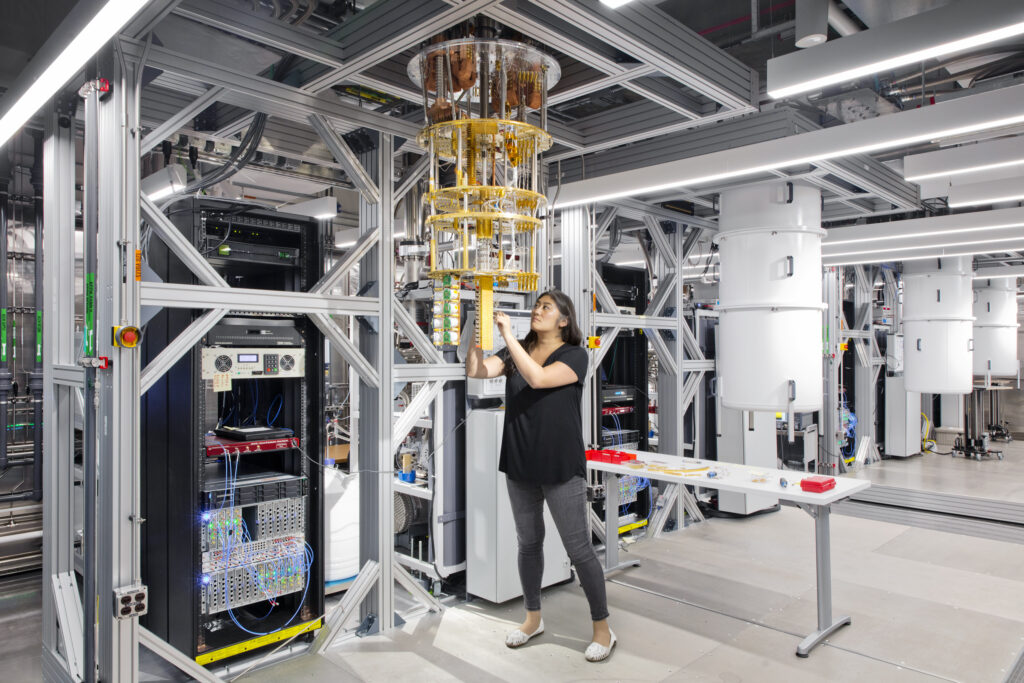Once considered a futuristic idea, quantum computing is now developing rapidly and has captured the attention of experts, governments, and major technology companies. Although the field is still in its infancy, the next five years promise a dramatic transformation that will change the capabilities of computers. Quantum computers use quantum bits (qubits) instead of bits, like conventional computers. This allows them to perform complex calculations at speeds unattainable with current technology. This transformation promises significant advances in areas ranging from healthcare to national defense. It is a tool worth keeping a close eye on.
The Current State of Quantum Computing
Quantum computing is currently primarily used in research labs and on specialized projects at IBM, Google, and Microsoft. These teams are creating samples using small numbers of qubits, experimenting with algorithms, and working on problems such as error correction and ensuring qubit stability. While these tools are not yet accessible to most people, developments over the past decade suggest that the technology is developing faster than many had imagined. Early applications of quantum technology could be commercially available within the next five years.
Advances in Quantum Hardware
One of the biggest challenges in quantum computing today is developing stable hardware that can perform complex mathematical calculations without external interference. Researchers hope to create systems with more stable qubits and better error correction methods within a few years. Companies are also exploring various approaches, such as superconducting qubits, trapped ions, and optical systems. Each has its own advantages. As the technology advances, quantum computers will become increasingly powerful. Soon, they will no longer be just laboratory instruments; companies will be able to use them to solve real-world problems.
Software and Algorithms Play a Critical Role
It is crucial to work on both the hardware and software aspects of quantum computing. Quantum computers are programmed very differently from conventional computers. In the next five years, more quantum computing languages and tools will become available, making the technology more accessible to more people. Companies and students who don’t need to work in specialized laboratories can experiment with quantum tools via cloud services, similar to how cloud computing has transformed traditional IT infrastructure.
Future Outlook: Industrial Applications
Quantum computing is more than just speed; it can solve problems that conventional computers can’t. In five years, companies in sectors such as banking, shipping, and pharmaceuticals will begin experimenting with quantum solutions. For example, pharmaceutical companies could use quantum computing to simulate molecular interactions and accelerate the development of new drugs. Financial institutions could use it to perform complex risk analyses, while shipping companies could use it to improve global supply chains in ways that are currently unfeasible. These early applications will demonstrate the technology’s practical applicability.
Implications for Cybersecurity
Cybersecurity is one area where quantum computing will have a significant impact. Certain forms of encryption, such as RSA, rely on the complexity of factoring large numbers, something quantum computers may easily achieve in the future. This raises questions about the security of digital activities and interactions. Therefore, scientists have begun researching post-quantum cryptography, also known as “quantum-resistant” encryption. This field will make significant progress over the next five years as governments and businesses prepare for the advent of quantum computing.
Applications of Artificial Intelligence
The two most important technological trends today are artificial intelligence (AI) and quantum computing. The combination of the two promises enormous advances. Quantum computers may be able to process enormous amounts of data much faster, enabling artificial intelligence systems to learn better and faster. In the coming years, initial tests will investigate how quantum technology can improve machine learning methods. This will pave the way for better and more practical applications of AI in many areas.
Global Investment and Competition
This is not just a technological race; it’s also a political one. Quantum science is gaining traction.
Reducing errors and increasing the number of qubits remain major challenges. Currently, only large companies and governments can use quantum systems because they are prohibitively expensive to build and maintain. Some of these problems could be solved within the next five years, but widespread adoption could take even longer. Nevertheless, the progress made during this period will determine how computers work in the future.
Quantum Computing Questions
Quantum computing differs from conventional computers
In conventional computers, bits represent 0 or 1, but in quantum computers, qubits can represent multiple states simultaneously. This allows quantum computers to solve certain problems much faster than conventional computers.
When will quantum computers be used for everyday purposes?
Quantum computers are still under development, and it could take more than a decade before they are practically applicable for everyday use. However, cloud-based access to quantum systems will increase over the next five years. This will make them more accessible to companies and students.
Can quantum computing crack encryption?
Yes, very powerful quantum computers could potentially bypass many current security regulations. Therefore, post-quantum cryptography is being developed to ensure the security of future communications.
Which sectors will benefit most from quantum computing?
Pharmaceuticals, banking, transportation, and energy may be the first to benefit from quantum computing, as it can help them solve complex problems that are difficult for conventional computers.
Are quantum computing and artificial intelligence the same?
The two systems are incomparable. Quantum computing essentially uses quantum bits (qubits) to solve complex mathematical problems. Artificial intelligence, on the other hand, focuses on building systems that can learn and make choices. In the future, however, the two fields may become more interoperable.
In short
The next five years will be crucial for the future of quantum computing. While it may not yet replace conventional computers, the advances in hardware, programming, and commercial applications will be enormous. Quantum computing offers enormous potential, enabling everything from developing new medicines to improving hacking techniques and increasing the intelligence of artificial intelligence. Governments, businesses, and academia are investing heavily to be part of this revolution. Over time, quantum computing will evolve from theory to practical tools. This heralds a new era of scientific progress, with profound implications for businesses and individuals worldwide.

